Key Takeaways
- Oil exploration has caused severe and long-lasting environmental damage in the Niger Delta region. Gas flaring, oil spills and untreated waste have destroyed ecosystems, including Africa’s largest mangrove forests, and have led to health risks and loss of biodiversity.
- Pollution has destroyed farming and fishing livelihoods, reduced agricultural productivity by up to 60% and led to major health issues like cancer, birth defects and reduced life expectancy.
- Failure to address local grievances has fueled instability in the Niger Delta region. The 2011 UNEP cleanup plan for Ogoniland remains unfulfilled and underfunded, reflecting poor governance and deep-seated political apathy.
- Farming and fishing, which support 70% of local jobs, are collapsing. Exposure to polluted water and air has led to respiratory diseases, cancer and also a 10-year drop in life expectancy in affected areas.
- The consequences of decades of oil exploitation have triggered the rise of militancy and insurgency in the Niger Delta.
- To break the cycle, Nigeria must enforce environmental laws, fund cleanup efforts, support affected communities, and shift toward renewable energy. Only a systemic overhaul can restore the Niger Delta and ensure long-term environmental and social justice.
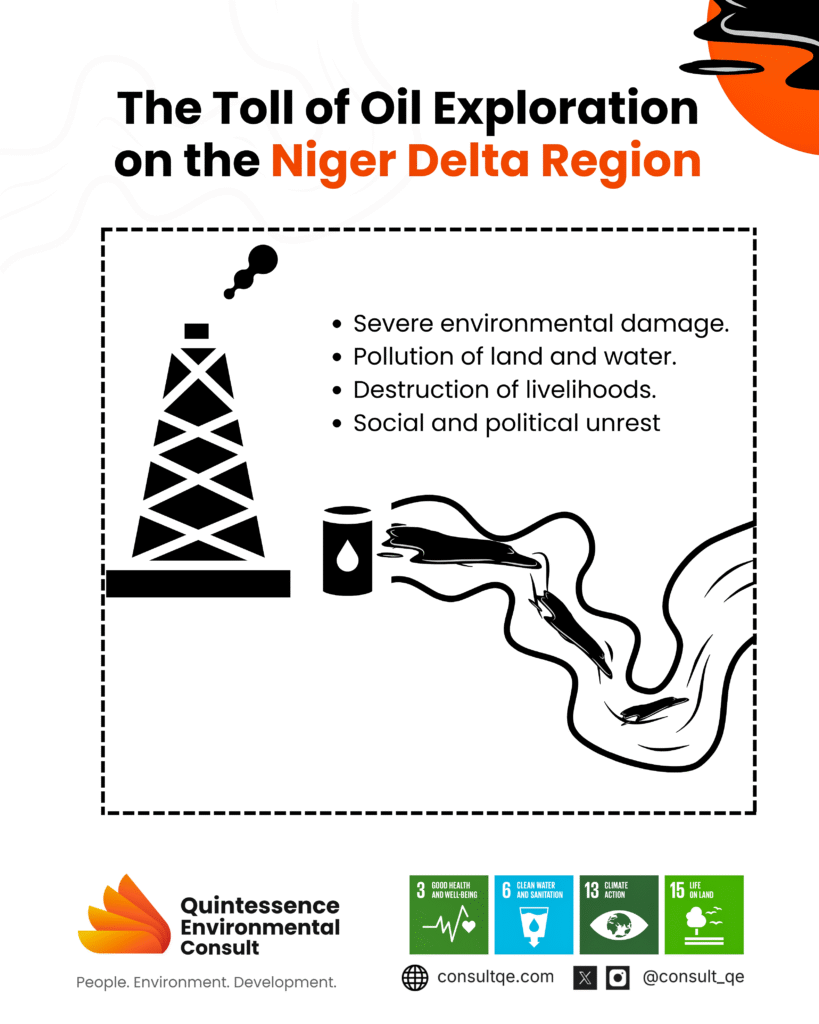
Introduction
Did you know that 90% of Nigeria’s export earnings come from crude oil? And the majority of its exploration sites are situated in coastal areas specifically in the Niger Delta region. For decades, oil exploration activities have fueled the nation’s economy without a comprehensive sustainability framework for safeguarding the environment, communities, and local economy. Despite the major earnings, oil exploration in Nigeria’s Niger Delta has not met the expectations for sustainable development due to harmful impact from oil spills, gas flaring, and land degradation.
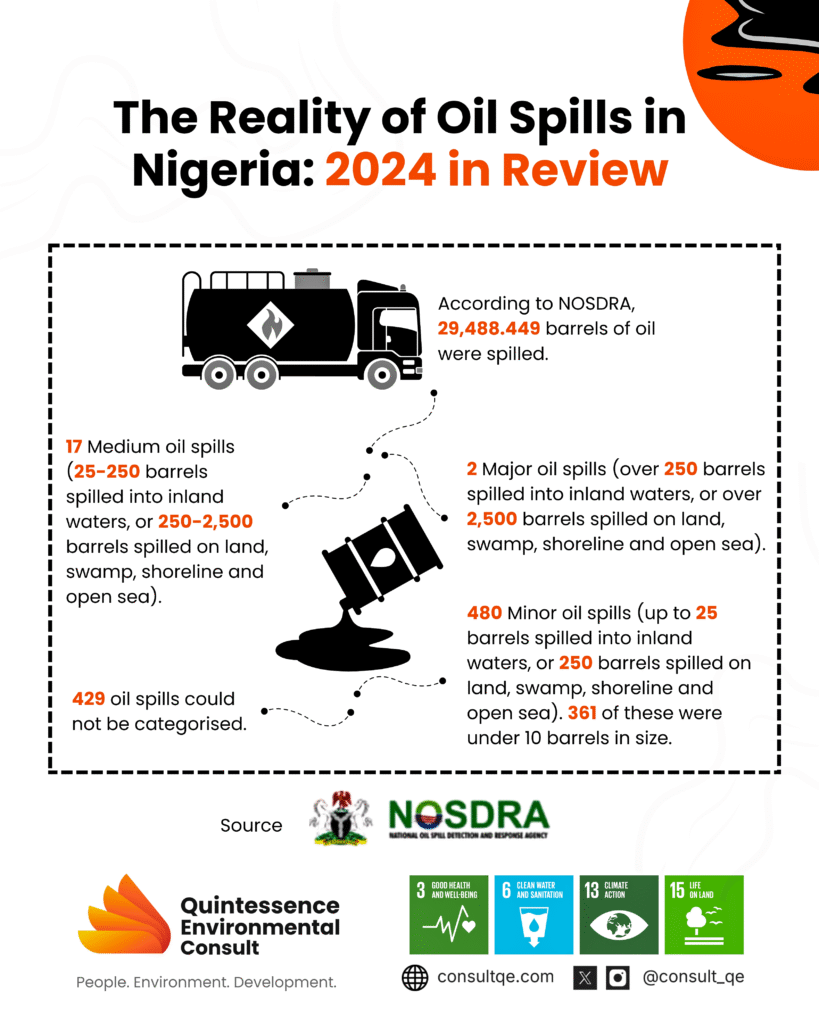
Decades of oil spills, gas flaring, and untreated effluent discharges from facilities have degraded ecosystems in the coastal regions. As sea levels rise and floods threaten coastal communities, the United Nations warns that over a million people in this region face heightened risks of waterborne diseases and displacement. Immediate measures need to be taken to address the situation to protect Nigeria’s economic interests while limiting environmental vulnerability. The question now is, “How did Africa’s largest oil-producing region become a sacrifice zone?” This is not just an environmental crisis, it is a story of exclusivity. Let us dive in.
The Legacy of Nigeria’s Oil Exploitation
Oil was first discovered in the Niger Delta in 1956 by Shell-BP in Oloibiri, Bayelsa State. Multinational corporations like Chevron and ExxonMobil also tapped into this oil gold rush, exploring billions of barrels of oil, generating immense wealth for Nigeria, yet leaving its coastal regions in ruin as they gained little or none of the wealth, only pipelines, spills, and flames.
In the Niger Delta region oil spillage usually occurs almost daily, with an estimated 240,000 barrels spilled yearly (compared to 4,000 barrels in the U.S. Gulf Coast). This results from the release of crude oil products into the environment through their extraction, refining, transportation, storage of petroleum, and illegal bunkering. (1) In 2024, NOSDRA reported that 29,498.449 barrels of oil (4,659,174.923 liters) were spilled into inland waters, on land, swamps, shorelines, and open seas. (3) See image below.
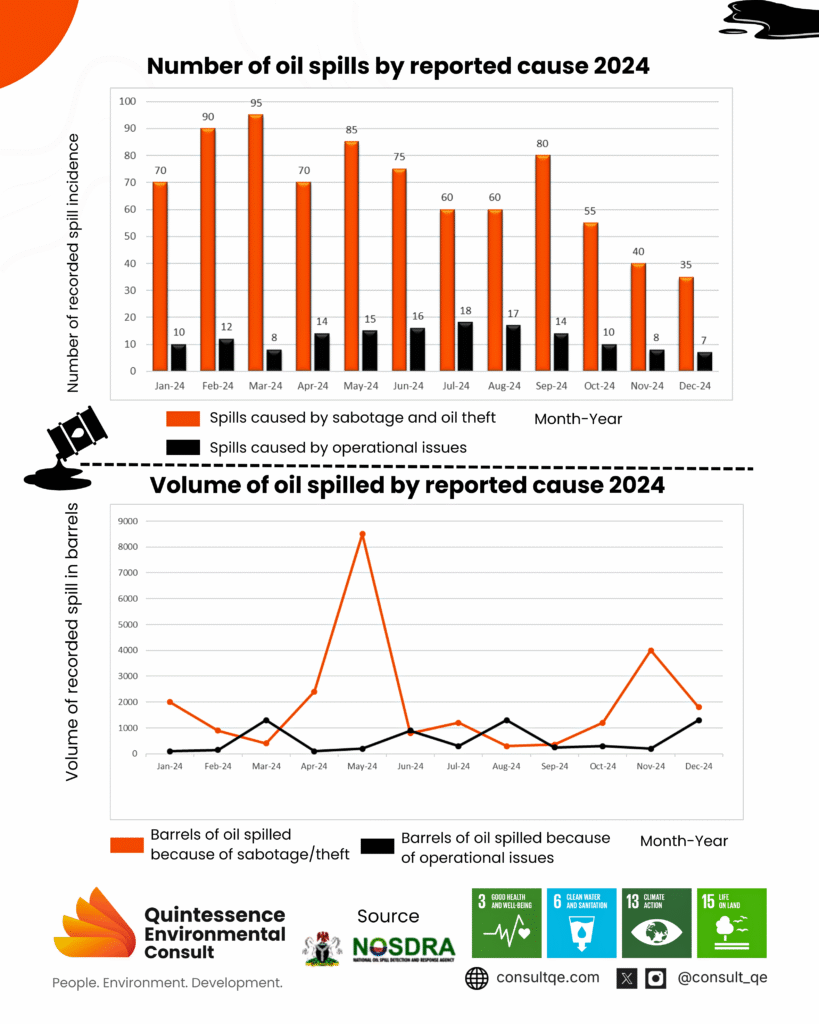
A 2011 UNEP report exposed the devastation in Ogoniland: poisoned water, dead ecosystems, and a $1 billion cleanup plan that is still incomplete today. UNEP reported that cleaning up Ogoniland alone could take 30 years. Decades of oil exploration have left coastal communities grappling with severe environmental, economic, and social consequences. While oil wealth has enriched a few, the people living in these regions suffer from pollution, health hazards, and economic neglect. (7)
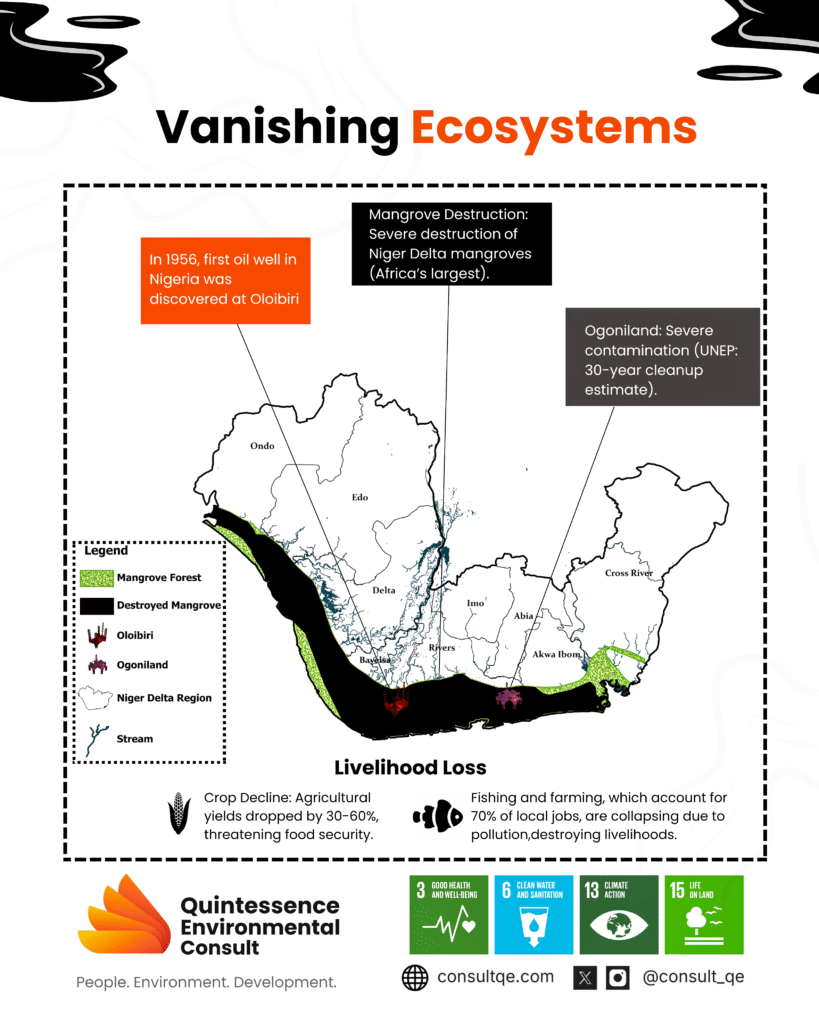
Environmental Degradation
The effect of oil exploration has always been a never-ending crisis in Nigeria. As of 2022, Nigeria accounts for 9% of global gas flaring, wasting resources and polluting the air (4). Gas flaring emits harmful pollutants like CO₂, methane, and benzene, known to cause cancer and respiratory diseases. Additionally, it releases sulfur and nitrogen oxides, which react with rainwater to form acid rain. This acid rain devastates crops, corrodes buildings, and disrupts aquatic ecosystems, posing severe risks to both human health and the environment. Similarly as oil spillage affects our ecosystem, report highlights the severe destruction of the Niger
In addition, Oil exploration demands extensive land clearance for drilling sites, pipelines, and access roads, resulting in severe ecological damage. Forests are destroyed, diminishing their ability to absorb CO₂ and accelerating climate change. Wildlife habitats are fragmented or erased, pushing endangered species closer to extinction and disrupting fragile ecosystems.
Delta mangroves—the largest mangrove ecosystem in Africa—which have suffered extensive degradation; likewise fish populations have declined by over 60%, crippling local economies. Once oil and marine tar residues are deposited on or around the mangroves, they stick to the plant surfaces, adsorbing to oleophilic surfaces of both flora and fauna. The oil coats the breathing surfaces of roots, stems, and seedlings, contaminating surrounding sediments and their sessile intertidal or burrowing fauna. (5)
Economic and Health Impacts
Livelihoods have been destroyed as fishing & farming contribute to 70% of local jobs, now collapsing due to pollution(15). A 2020 World Bank study found that oil spills reduce agricultural yields by 30-60%. According to Campbell (2010), the oil pollution in Olobiri and Ijaw lands has eroded soil nutrients, thus sharply reducing agricultural productivity. A study reveals that infants in Nigeria face twice the risk of dying within their first month if their mothers have lived near an oil spill site before conception. (14)
In 2017, UNEP scientists discovered an 8 cm layer of refined oil floating on the groundwater serving the Nisisioken Ogale wells. This was reportedly connected to an oil spill six years before 2017. UNEP found benzene (a carcinogen) in drinking water at 900 times the World Health Organization’s acceptable limit (10 micrograms per liter (µg/L)). Many children suffer from lead poisoning, skin diseases, and birth defects. Due to prolonged exposure to environmental pollution from crude oil production, the life expectancy in the Niger Delta is approximately 10 years lower than the national average in Nigeria. (7)
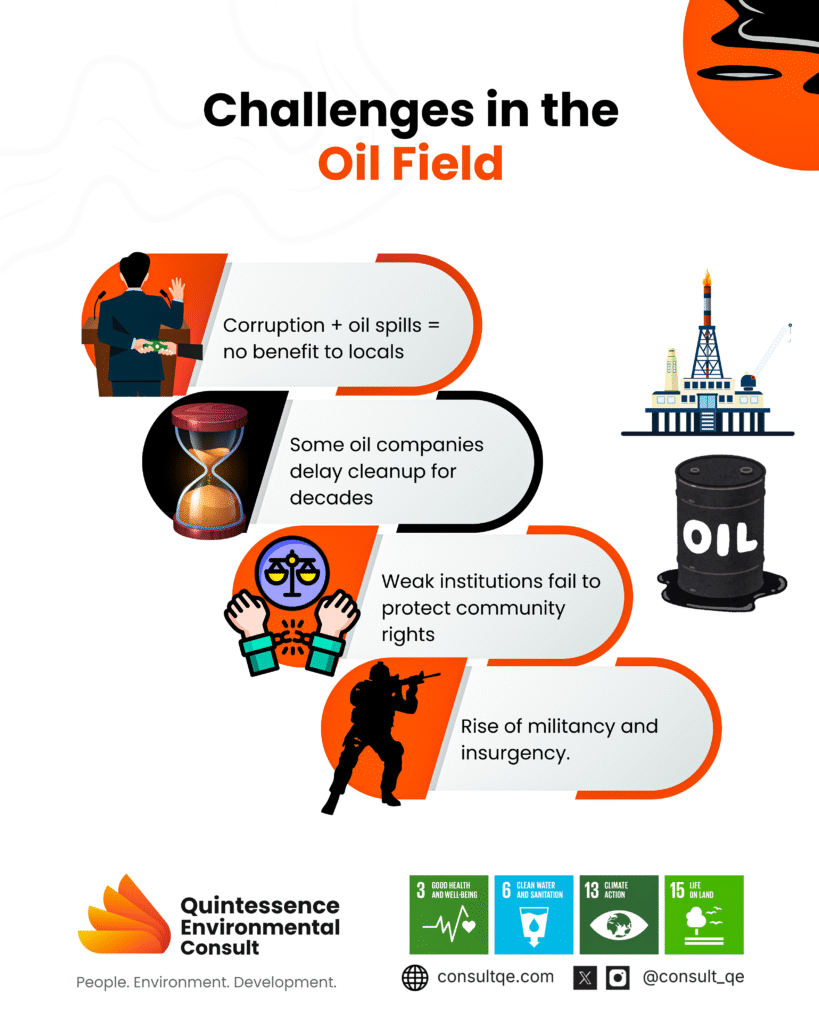
Social and Political Consequences
Decades of neglect have fueled resentment and conflict as the attacks on oil industry facilities and kidnappings for ransom are frequent in the creeks of the Niger Delta. (9) Residents often accuse the government and oil companies of prioritizing profit over people’s safety and security. The rise of militancy and insurgency in the Niger Delta is deeply intertwined with the consequences of oil exploration as environmental degradation displaced thousands, exacerbating poverty thereby triggering protests.
The acquisition of land for oil extraction has led to widespread displacement, disrupting traditional social structures and eroding community cohesion. Oil-producing regions have suffered from systemic neglect, with insufficient investment in infrastructure, education, and healthcare, further entrenching social exclusion and widening inequalities.
In addition, the unequal distribution of oil wealth, coupled with the environmental and economic damage caused by extraction activities, has fueled persistent unrest. This has manifested in violent conflicts, frequent protests, and clashes between armed groups, local communities, and government forces.
Moreover, oil revenues have often been exploited as a tool for political manipulation. Rather than fostering development, the region’s resources have been weaponized, with marginalized communities used as bargaining chips in broader political power struggles. This cycle of exploitation and neglect continues to destabilize the region, perpetuating conflict and undermining sustainable progress.
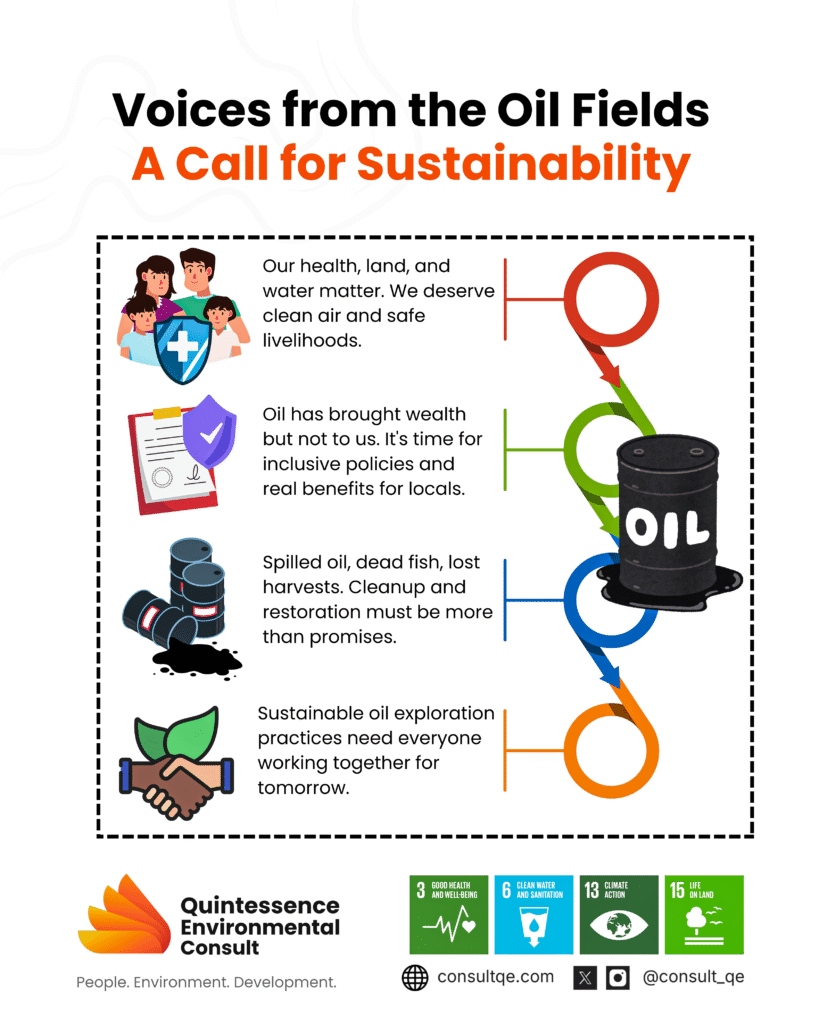
Government and Corporate Responsibility
Oil has generated hundreds of billions of pounds in revenue for the Nigerian government since its discovery in the Niger Delta over 60 years ago. Yet, the region remains home to some of the poorest communities in West Africa. (9)
Accountability Gaps: Weak regulation and poor enforcement of existing frameworks allow corporations to evade their cleanup responsibilities. This poor enforcement is largely credited to overlaps and conflicts of interest among regulatory agencies and lack of capacity. (11) Regulatory bodies often fail to hold these companies accountable.
Corporate Negligence: Oil companies frequently blame spills on sabotage to avoid liability, despite clear evidence of aging and poorly maintained infrastructure. This practice has become normalized, delaying justice for affected communities.
- Lack of Information and Transparency: Host communities are often denied access to vital information regarding oil operations and their potential impact on health and the environment, exacerbating anxieties and distrust.
Delayed Justice: The 2011 UNEP cleanup plan for Ogoniland is a prime example of systemic neglect. Years later, the initiative remains underfunded and mismanaged, reflecting a broader culture of apathy toward environmental and social justice.
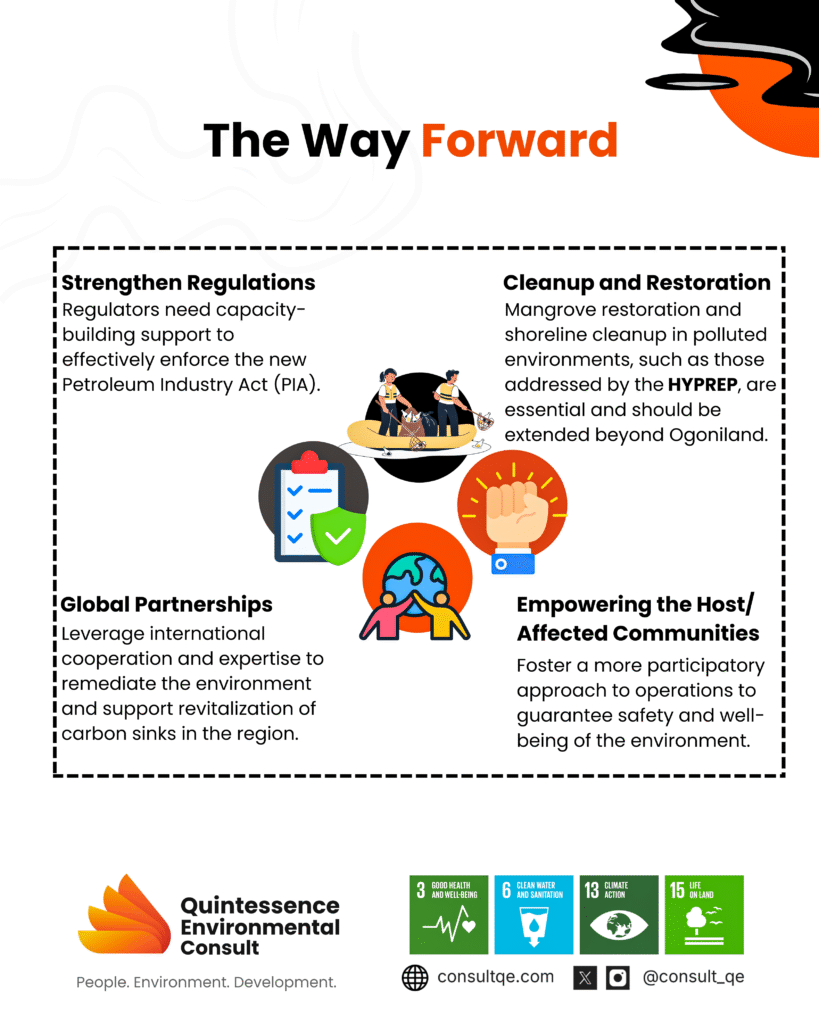
The Way Forward
To mitigate the crisis, stakeholders must act:- Strengthen Regulations: The current regulations are not only ineffective but also poorly enforced. To address this, regulators must be empowered through capacity-building initiatives to ensure rigorous enforcement of the newly enacted Petroleum Industry Act (PIA). Additionally, strict penalties for oil spills should be imposed, and companies should be mandated to upgrade to modern, environmentally sustainable infrastructure.
- Empowering the Host/ Affected Communities: To discourage oil pipeline sabotage and prevent spills, it is essential to sensitize the host/affected communities by providing them with access to information about oil operations. Additionally, there should be a push to enforce the PIA 2021 Act, ensuring host communities feel a sense of inclusivity in decision-making and that oil revenues are allocated for environmental protection and resource management. This includes establishing effective communication channels and participatory mechanisms that empower communities to voice their concerns and actively contribute to solutions. (13) With these measures in place, incidents of vandalism, sabotage, or other civil unrest that damage petroleum facilities or disrupt oil production, leading to spills in host communities, would be significantly reduced.
- Revamping Compensation Systems: Establishment of an independent oversight body to manage and resolve oil spill compensation claims, guaranteeing fair, efficient, and transparent payouts for impacted communities. This system must operate with integrity, ensuring equity and shielding the process from external interference.
- Cleanup and Restoration: The government, the Joint Ventures (JV) partners, and Co-venturers must contribute their share of funds for oil pollution clean-up and environmental management. (11) It is recommended that the requirement to clean up and restoration of the impacted sites to all practical extent be interpreted to involve the use of best available technology (BAT) for the process – equivalent to the standard used in Alaska, USA.(12) Mangrove restoration and shoreline cleanup in polluted environments, such as those addressed by the Hydrocarbon Pollution Remediation Project (HYPREP), are essential and should be extended beyond Ogoniland. Expedite the Ogoniland cleanup and expand the reforestation of mangroves.
- Health Interventions: Provision of robust health services to communities affected by oil pollution, including monitoring, screening, treatment, and preventative care. Investment in accessible healthcare infrastructure and education initiatives focusing on health risks associated with oil pollution is crucial.
- Global Partnerships: Leverage international aid and expertise for climate-resilience projects.
Conclusion
The Niger Delta has faced significant environmental challenges due to decades of oil exploration activities. While the region’s natural resources have contributed substantially to Nigeria’s economy, the extraction processes have unfortunately led to various ecological impacts that deserve attention. Oil spills have affected some waterways, potentially influencing local fishing activities, and gas flaring practices have raised concerns about air quality in certain areas. Agricultural productivity appears to have been affected in some locations where spills have occurred. These environmental changes have understandably caused concern among local communities whose livelihoods are closely tied to the land and water.
It is important to recognize that addressing these issues requires balanced solutions that consider both environmental protection and economic realities. Some positive steps have been taken, including the initiation of cleanup projects and the implementation of the Petroleum Industry Act, though more progress could certainly be made. As Nigeria continues to develop its energy sector, there are opportunities to improve environmental management practices while still meeting the nation’s economic needs.
Therefore, immediate action is needed to enforce strict environmental regulations, accelerate cleanup efforts, hold oil companies accountable, and invest in sustainable alternatives. The Nigerian government and other relevant stakeholders cannot ignore this ecological and humanitarian disaster, as a whole ecosystem and community of people depend on urgent systemic change.
Should Nigeria invest more in renewables? Kindly share your thoughts.
- Ukhurebor, K. E., Athar, H., Adetunji, C. O., Aigbe, U. O., Onyancha, R. B., & Abifarin, O. (2021). Environmental implications of petroleum spillages in the Niger Delta region of Nigeria: A review. Journal of Environmental Management, 293, 112872. https://doi.org/10.1016/j.jenvman.2021.112872
- https://www.amnesty.org/en/latest/ news/2018/03/niger-delta-oil-spills decoders/#:~:text=Swimming% 20in%20oil, reality%20may%20be%2 0even %20worse.
- https://nosdra.oilspillmonitor.ng/ Oil spill data summary (2024).
- https://www.canadianenergycentre.ca/wp-content/uploads/2023/10/CEC-Fact-Sheet-98-V2-Sept-29-2023.pdf
- Zhang, B., Matchinski, E. J., Chen, B., Ye, X., Jing, L., & Lee, K. (2019). Marine oil spills—oil pollution, sources and effects. In World seas: an environmental evaluation (pp. 391-406). Academic Press.
- Campbell G. 2010. ‘No Amount of Crying Extinguishes a Single Flare in the Niger Delta’, Journal of Urhobo Historical Society 12(2), 34-35.
- https://www.unep.org/news-and-stories/story/unep-ogoniland-oil-assessment-reveals-extent-environmental-contamination-and
- World Bank. (2020). The economic impact of oil spills in the Niger Delta.
- British Broadcasting Corporation (BBC) (2009) The Curse of Nigerian Oil. http://news.bbc.co.uk/1/hi/programmes /from_our_own_correspondent/ 7808670.stm
- Kulungu, Mustapha. (2021). Movement for the “Emancipation of the Niger Delta” (MEND) Constitutes a Threat to the U.S. National Security. OALib. 08. 1-17. 10.4236/oalib.1107465.
- Ele, Millicent. “Oil spills in the Niger Delta-does the Petroleum Industry Act 2022 offer guidance for solving this problem?” Journal of Sustainable Development Law and Policy (The), vol. 13, no. 1, 24 May 2022, pp. 130–161, https://doi.org/10.4314/jsdlp.v13i1.6.
- Alaska Statute, AS 46.04.030(e) (n 20), https://www.touchngo.com/lglcntr/akstats/ statutes/title46/chapter04/section020.htm#: ~:text=(A)%20not%20exceed %20the%20potential,owner %2C%20 operator%2C%20or%20charterer.
- https://oal.law/oil-pollution-in-the-niger-delta-a-national-crisis-requiring-urgent-federal-intervention/
- https://www.theguardian.com/global-development/2017/nov/06/niger-delta-oil-spills-linked-infant-deaths
- http://dx.doi.org/10.12692/ijb/22.3.30-50

Good